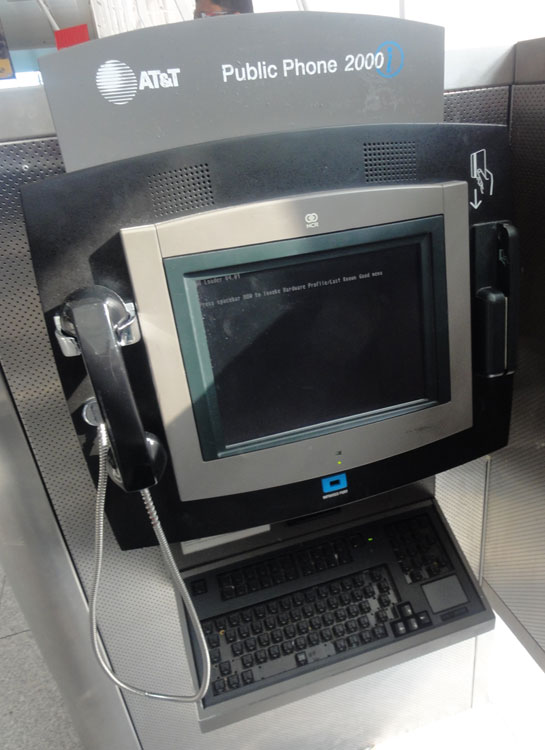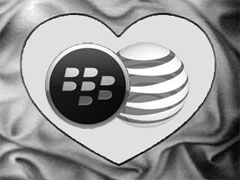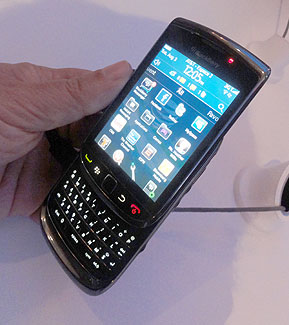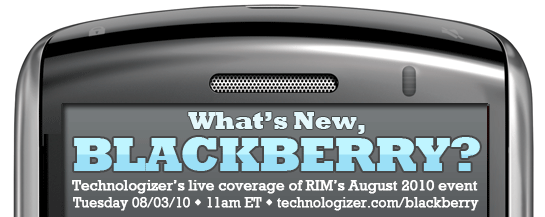I’m on a plane, so I’m not going to try it just yet, but the new version of Facebook for Android sounds cool.
Archive | Original Site
The Phone of the Future is Broken
This AT&T computerphone (which seems to be a model that dates from 1991) at JFK’s international terminal is stuck at Windows NT’s boot loader screen. Which isn’t a huge problem, because someone’s stolen almost all the keys–including, sadly, <Ctrl>, <Alt>, and <Del>.
I wonder when it last worked, and when anyone last wanted to use it? I came across it because I was doing what seems to be the most common activity at airport pay phones these days: sitting down so I could use my laptop.

3 comments
Why Fanboys Will Be Fanboys
You’ve read about the origins of the word “fanboy,” now read Andrew Groen’s exploration of their psychology.
No comments
Gaming is Blackberry Torch's Missing Piece
 Blackberry’s incoherent approach to video games never seemed like a problem before, but with Blackberry Torch and the new consumer focus of Blackberry 6, Research in Motion could soon find itself behind in the one area it overlooked.
Blackberry’s incoherent approach to video games never seemed like a problem before, but with Blackberry Torch and the new consumer focus of Blackberry 6, Research in Motion could soon find itself behind in the one area it overlooked.
The new trend in mobile gaming, and games in general, is social glue — the idea that a random smattering of games in an app store is no longer enough. People want to be involved in their games on another level, whether it’s the persistent beckoning of Farmville or the overarching achievement system of Xbox Live.
That glue is starting to ooze into mobile gaming. Apple sees the importance and is building Game Center, a layer of achievements, friends lists, matchmaking and leaderboards that developers can append to their games. When Microsoft launches Windows Phone 7 later this year, games will fall under the banner of Xbox Live, presumably with the same social features as its console counterpart. Google’s plans are a little murkier, but some kind of social gaming service is expected, and I’d be surprised if Android wasn’t involved.
Video games are not a trivial part of the smartphone experience. The number of smartphone owners who played games at least once a month increased 60 percent from February 2009 to February 2010, according to comScore. Games are the second-largest category in Blackberry App World, behind themes, and Compete says 54 percent of Blackberry owners have at least one game on their devices. Admittedly, that pales in comparison to iPhone owners, 51 percent of whom have five or more games installed, but maybe Apple’s extensive games catalog is one reason so many Blackberry owners are looking to jump ship.
Gaming will become a more important part of owning a smartphone, and social glue will be the factor that draws people to a platform and keeps them coming back. With Blackberry Torch and Blackberry 6 OS, RIM was so busy playing catch-up on key features, such as the browser and universal search, that it failed to see what the other major smartphone makers are working on next.
6 comments
Report: Motorola, Verizon Working on TV Tablet
The Financial Times is reporting that Motorola has teamed up with Verizon Wireless to develop a Android-based tablet device that would allow users to watch television on it. While it’s not clear if this is a mobile DTV-based offering or what, it appears somehow tied to Verizon’s FiOS entertainment service.
The device would have a 10-inch screen — which is in line with Apple’s iPad and BlackBerry’s apparently upcoming tablet device — and would likely launch in the fall. That autumn release date is also what RIM is targeting, meaning it could be an all out battle royale for tablet supremacy this winter.
Motorola has made it no secret that they are lusting after carving out their own spot in the tablet market, one that is all but owned by Apple’s iPad at the moment. The television functionality, depending on how it works, could provide a crucial differentiating point in attracting consumers to the device. Also working with Verizon Wireless, who currently has the most widespread 3G network, is also a crucial selling point.
The device will also support Flash, just like RIM’s tablet, which means the iPad again stands alone as the only modern tablet device not to support the now near-ubiquitous multimedia format.
My question is now with all these competitors, is Apple itself prepared for trench warfare? Obviously the easiest way to compete with Apple is on price — the “Apple tax” is well documented. But functionality of the iPad is going to have to also increase, meaning we may see new versions of the device sooner than the typical upgrade cycle from Cupertino.
Personally, a price break is what I’m waiting for.
5 comments
RIM and AT&T: The Love Affair Blossoms
 It’s tempting to interpret every move AT&T makes in terms of its relationship with Apple, its status as the exclusive iPhone carrier in the US, and the implications of that exclusivity ending, as it will someday. It’s also dangerous to think that way, because the tea leaves are all too hard to read. Still, one fascinating sidelight of this morning’s BlackBerry Torch launch was the degree to which it was a lovefest between RIM and AT&T.
It’s tempting to interpret every move AT&T makes in terms of its relationship with Apple, its status as the exclusive iPhone carrier in the US, and the implications of that exclusivity ending, as it will someday. It’s also dangerous to think that way, because the tea leaves are all too hard to read. Still, one fascinating sidelight of this morning’s BlackBerry Torch launch was the degree to which it was a lovefest between RIM and AT&T.
The first person on stage at this BlackBerry unveiling–the one who got to brandish a Torch in public for the first time–wasn’t a RIM honcho. It was AT&T Mobility CEO Ralph De La Vega. And RIM and AT&T executives handed off between each other for the entire presentation, spending nearly as much time praising each other as they did bragging about the new handset.
4 comments
BlackBerry Torch First Impressions: Fresh But Familiar, Indeed
 “The toughest thing about success is that you’ve got to keep on being a success.” Irving Berlin supposedly said that, and the quote was on my mind this morning as I attended RIM’s BlackBerry Torch launch in New York.
“The toughest thing about success is that you’ve got to keep on being a success.” Irving Berlin supposedly said that, and the quote was on my mind this morning as I attended RIM’s BlackBerry Torch launch in New York.
When Palm and Microsoft were faced with the challenge of fast-forwarding into the iPhone era, they had a perverse advantage: Their current products were so obviously part of smartphones’ past that it would have been riskier to stick with them than to start fresh. Hence Palm’s WebOS (a technical success even though it hasn’t yet shipped in a successful product) and Microsoft’s Windows Phone 7 (which, whatever it turns out to be, is anything but a Windows Mobile retread).
For RIM, the challenge is indeed tougher. BlackBerry phones are still selling well; their traditional strengths, such as serious e-mail and well-done physical keyboards remain strengths; they’re part of how the world does business. And yet it’s clear that BlackBerry faces a potentially existential threat from iPhone and Android, both of which are slickier, sexier, Webbier, and more modern than any RIM device to date.
7 comments
Lala's Lost, But is it Missed?
 Over at CNet, Greg Sandoval’s inside sources say Apple’s setting low expectations for cloud music, and hasn’t yet acquired licenses to stream songs from its own servers.
Over at CNet, Greg Sandoval’s inside sources say Apple’s setting low expectations for cloud music, and hasn’t yet acquired licenses to stream songs from its own servers.
In other words, the assumption that Apple acquired Lala to build its own streaming music service won’t pan out anytime soon. The Lala crew may actually be working on some sort of streaming video service instead, Sandoval’s sources say. Apple acquired Lala in December 2009, and shut it down in late May.
We’ve written about Lala quite a few times, because it took such a unique approach to digital music. In addition to selling MP3s, Lala sold streaming tracks for 10 cents each, and let you listen to any song once for free. It could also scan your entire downloaded music library and store a cloud version to be accessed anywhere. For Apple to offer any of those services, it needs more licensing from the music industry, and Apple reportedly hasn’t negotiated for that yet.
But as I look at the digital music landscape now, I don’t think Lala is really necessary. All-you-can-eat music services have emerged from Rhapsody, MOG and now Rdio, all of them offering mobile and desktop access for $10 per month, with the ability to download songs locally. That’s a lot more convenient than building a streaming library of individual tracks, and could be more economical for music junkies. If you just want to hear a song once for free, you can accomplish that with music search tools from Google and Bing.
As for the digital locker concept, how essential is it? Music doesn’t take up a lot of room, and storage capacity on mobile devices is only increasing. I’d rather see Apple focus on streaming video, because movies and TV shows are much more unwieldy to store and transfer. Although I was sad to see Lala go, I’m not desperate for it to come back.
One comment
Rdio Music Service: Mobile, Social, and Impressive–and Now Open to Everybody
 And the subscription music services just keep coming: Rdio, from Skype founders Niklas Zennström and Janus Friis, is leaving private beta today. That means that anyone can sign up for this ambitious new offering, which includes a Web-based service plus mobile apps for iPhone, Android, and BlackBerry. It competes against such services as Rhapsody and MOG, and from my time with it so far, it seems to do so formidably.
And the subscription music services just keep coming: Rdio, from Skype founders Niklas Zennström and Janus Friis, is leaving private beta today. That means that anyone can sign up for this ambitious new offering, which includes a Web-based service plus mobile apps for iPhone, Android, and BlackBerry. It competes against such services as Rhapsody and MOG, and from my time with it so far, it seems to do so formidably.
In terms of features, Rdio may be the most comprehensive iTunes substitute so far. (For the moment, at least–the competition is pretty intense in this category.) Like the late, lamented Lala, it can scan your music collection and add albums you already have to your online collection. (It doesn’t match Lala’s ability to give you online access even for stuff that’s not in its own collection, though, and it’s not finding every track in my library.) Its iPhone app supports iOS4 multitasking, so you can listen in the background while using another app. It has a neat syncing feature that lets you find music in your desktop browser, then auto-download it to your phone for listening whether or not you have Internet access.
Like Lala, Rdio also emphasizes the social aspect of music: Its Web-based version lets you find and follow friends and peek at the music they’ve been listening to. Every time I try a feature like this, I’m struck by the fact that my friendships almost never seem to have anything to do with shared tastes in music. But maybe you’ll find it a useful way to discover songs you’ll like.
The service says it currently offers seven million songs–fewer than Rhapsody’s ten million plus or the 13 million in Apple’s iTunes Store, but still impressive.
Rdio is a paid service, and follows the standard pricing for subscription music: The Web-based version is $4.99 a month, and Web-plus-mobile is $9.99 a month. In both cases, you can listen to all the music you like as long as you keep paying. The $9.99 fee seems to cover multiple devices (Rhapsody charges $14.99 a month if you want to listen on more than one mobile gadget).
Subscription music remains a theoretically appealing idea that surprisingly few folks choose to pay for. (People who are willing to plunk down money for songs, it seems, prefer to buy them outright rather than rent them.) But Rdio comes close to erasing all the downsides of subscriptions except for the need to keep paying, and I’ll bet its major competitors will match most of its features soon. If you’d like to feast on music for $10 a month, give it a listen.
One comment
BlackBerry Event Live Coverage
Greetings from New York. RIM’s BlackBerry event starts at 11am ET (8am for you west coasters). I’m there and hope you’ll join me.

